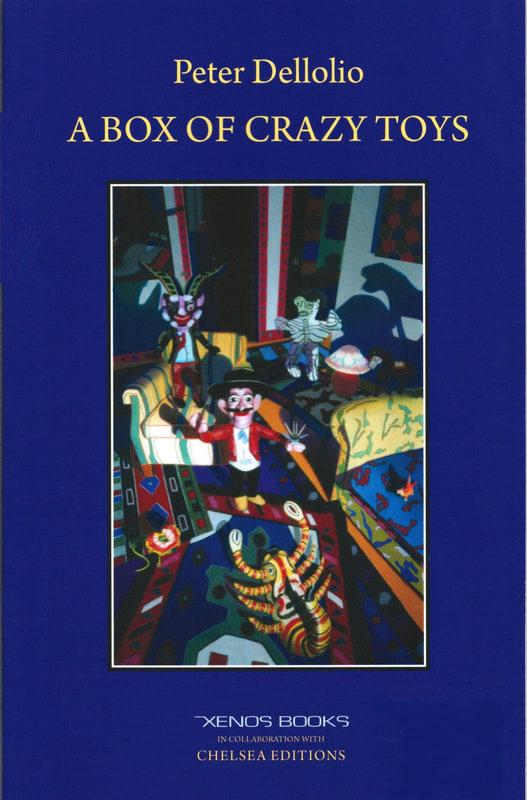|
A Box of Crazy Toys by Peter Dellolio (Xenos Books, 2018)
Review by Greg Bem Silent films are projected upon the foreheads of children. The little ones vomit miniature skyscrapers made of exotic African woods. (from “Skeleton Accordions”) Entering the world of Peter Dellolio is a walk along the bridge between charming and disturbing. To read his short forays into narrative poetry is to be immersed in the dreamscapes of another’s twisted mind. The sensations of imagery as grotesque as they are marvelous are sensations disturbingly crystalline. The metaphors of these poems are enthralling but agonizingly elsewhere; a book as relentless as A Box of Crazy Toys may be one better to take in small bits rather than, as per my approach, read in a single go. The world among us is filled with a roaring blend of the absurd and the abstract, and Dellolio’s poems appear to meet that standardization, that landscape of normal weirdness, head-on. In reading A Box, I couldn’t help but find analogous contexts of the bizarre and spaces of the extreme like Magical Realism Bot, a Twitter account with the sheer purpose of going to the edges of understanding with heightened juxtapositions and realms of distortion. Likewise, I was reminded by the Surrealists, whose operations nearly 100 years ago found similar resolutions and conclusions through their own bending and prying of an emerging world of crisis and reaction. Indeed, Dellolio’s “box” appears to be in the same way a toolkit to showing readers what is possible through the mechanisms of an opened, unrepentant mind, a mind capable of agreeing to the extreme image and holding itself accountable to it as well. Cream puff nipples on the muscular breast of the lion tamer. (from “Maggot Wheels”) And yet despite these fervent commitments, these sequences of wrestling the lines toward new heights of interpreting and appreciating the booming world of this continuing bark of a 21st Century, there is a noticeable difference between the roots, the ancestors, the earliest writers taking these approaches. Indeed, while the Dadaists, Surrealists, Expressionists, and many other loud groups engaging the image as a form of triumph and call to understanding power, focusing on social evolution, and otherwise rewiring the poet’s voice, the work of Dellolio here appears to be softer, softly incandescent, and even withheld. A rigidity that strikes me as apolitical and even (at best) timid and (at worst) repressed emerges out of the miscellaneous craziness of Dellolio’s “toys.” The playfulness and the toying around does not strike me as youthful and childlike, but rather reflective of the consumerism and information overload serving the beck and call of the new Americanization of the 2010s. A space uprooted by search engines, fluttering social media posts, and submerged cellphone behavior. A moment in human bondage honoring and protecting displacement, quietude, and passivity. In some ways, these qualities of the shared, damned reality of so many appear as faux friendliness, but the inner conflicts that continue to cause crisis and discontent, evolved marginalization and demonization alike, pop out of the “box” much like the viral content, the glittering popularity, the potential for greatness. The irony of the “crazy toy” is that it’s most enjoyable but also most chaotic; it is, like Dellolio’s images and poetic instances, a presence both gravitational and destructive. To the book’s benefit and detriment, these poems are hardly self-referential, and hardly evoke a world beyond themselves. They are, like Magical Realism Bot, so far pushed into the absurd and abstract that their landscape is one of isolation; there is a protection and confinement that allows them to flourish and stand brightly on their own, but how they move beyond their own privileged cores is unnoticeable. And perhaps that’s the point, in reading A Box of Crazy Toys, in thinking about the ultimate constraint of poetry (perhaps now, perhaps always), that there is a context that will always be present and yet unavoidable. A context of constraint, an engagement of limitation, a necessary restriction to the dreams and desires of the poet themselves. The dolphin, weeping for its fallen brethren, slaughtered and fashioned into this artificial speaking device, dons a whipped cream space helmet and floats towards the rocket. (from “The Clown’s Three Large Buttons”) Pulling through what are quite clearly memories of actual places, situations, and circumstances, from his life and memories, Dellolio’s poems in A Box of Crazy Toys are, despite their level of the beyond, quite human. They are personal, they are funny, and they are communicative. I found myself laughing with these poems in ways I haven’t with poetry in some time. Despite the contentions the book aroused in my own understanding of a poetic present, this collection served with modes of entertainment, aesthetic appreciation, and a warmth toward fresh investigations of language. The yearning to keep reading made me question the antiquity of many forms of poetry, and where the poet may or may not be serving. I wonder if Dellolio has considered the effect of such poetry, in its extreme forms, as existing and affecting outside of itself, of continuing to expand beyond its own limitations once it infectiously brushes up against the reader. Where the poet may take their elements of the magical and of the real going forward is curious. How the conversation might be more directly woven beyond the poems themselves, if such a thing is possible, is even more curiouser.
3 Comments
GREG PITTMAN
5/16/2018 03:44:53 pm
AWESOME .....I HAVE BEEN WAITING FOR SOMETHING AS TWISTED AND DARLING AS THIS !!!!!!!
Reply
Avery Beaverman Quincy
7/1/2018 09:37:56 am
Me too! Waiting...like a clown.....forever
Reply
Michele St. Amour
5/18/2018 12:10:13 pm
I love this style!
Reply
Your comment will be posted after it is approved.
Leave a Reply. |
Welcome to Yellow Rabbits. Thanks for visiting.
All reviews by Greg Bem unless marked otherwise.
SearchYellow Rabbits Reviews
Archives by Month
August 2019
|

